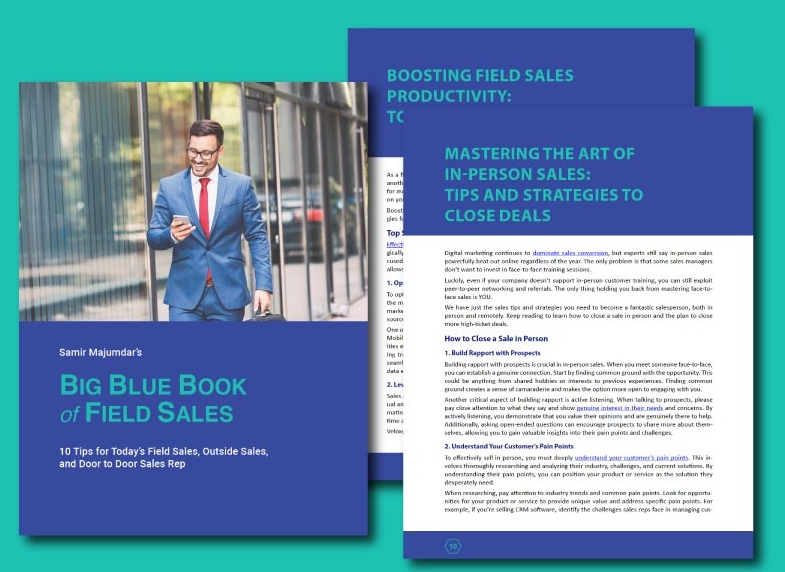
10 Best AI Sales Tools for 2024 to Maximize Your Revenue
Are you ready to revolutionize your sales process and skyrocket your team’s productivity? In today’s competitive landscape, the key to success lies in adopting cutting-edge technology. AI sales tools are transforming the way sales teams operate, automating tasks, providing valuable insights, and optimizing efficiency. Discover how these powerful tools can help you stay ahead of the game, improve customer engagement, and maximize
















AI sales assistant software programs play an increasingly important role for sales teams.
So, choosing the best AI sales assistant is crucial. There are many different AI for sales programs now available. Here at Veloxy, we are proud to say that we consistently earn recognition as one of the best AI sales assistant software programs available. But you don’t need to take our word for it; you can see what our customers have to say by taking a look at our ratings.
In 2022, G2 awarded Veloxy its Top 50 Sales Software award in recognition of Veloxy’s position as one of the best AI sales assistant software programs available.
You can read our customer reviews on the G2 website to discover more about our performance ratings and how we are rated above the competition. Alternatively, you can find more reviews and ratings from our satisfied clients over at SourceForge.
Right now, you may be wondering why Veloxy is such a popular product and why it makes the perfect partner for your business. In this post, we will explain what AI sales assistant software is and how it works. We will dive deep into why your business needs an AI sales assistant program and the key features the program needs to have. Finally, we will explain why so many satisfied users choose Veloxy to provide all their AI sales assistant needs.
What is AI Sales Assistant Software Used For, and How Does it Work?
So, now that you know Veloxy is a highly-rated product, you may be wondering what is AI sales assistant software and how does it work. Well, sales assistant software, such as Veloxy, uses artificial intelligence to automate tasks and processes. Using AI sales assistant software enables sales agents and marketing teams to free up their time and work more efficiently.
With the help of embedded artificial intelligence, a wide range of tasks, usually completed in person by the sales and marketing teams, can be automated. Examples of just some real-time tasks and processes that can be handled by an AI sales assistant include the following:
As you can see, there are many real-time tasks that can be taken care of using an AI sales and marketing assistant. Taking away these more basic tasks enables your sales and marketing teams to focus on projects where they can put their expertise to use. This means less time being stuck completing time-consuming, mundane tasks for your team and increased efficiency and productivity for your organization.
Along with taking care of many mundane tasks, sales AI also enables sales reps to make the transition from selling from the office or in the field. This feature has been especially beneficial since the arrival of the pandemic and facilitates the trend for virtual sales that began due to COVID-19.
How does AI Sales Assistant Software Work?
AI sales assistant software can be used as a standalone application. However, in most cases, AI sales programs integrate with the business’s existing software. For example, Veloxy works with Salesforce, Gmail and Outlook, and iPhone and Droid.
AI sales assistant software shares common functions with sales analytic tools, sales intelligence, guided selling tools, and conversational marketing software. However, using AI sales assistant software offers additional capabilities. The inclusion of artificial intelligence and task automation makes AI sales assistant software especially beneficial for sales teams.
If you are keen to start experiencing the benefits of AI sales assistant software for your business, you may be wondering how to choose the best option. With so many different AI sales software programs available, it can be hard to know which one will bring the most value to your business.
Here are some of the features to look out for when choosing AI sales software to integrate into your business:
1. Choose Software Built by Vendors that Understand Sales and Marketing
To build software that truly benefits a sales and marketing team, you need to have experience of working in these roles. So, when selecting the best AI sales software for your business, you need to choose a vendor that understands your needs.
Before you sign up for AI software, it is crucial to do your homework. Ensuring that the software has been tried and tested by users with needs similar to your own is vital. Checking that the vendor fully understands the capabilities required by your business and that they can fully meet these needs is crucial.
To gain reassurance on the suitability of the software before you commit, it is essential to check testimonials from genuine existing clients. The importance of carrying out a little research before committing to ensure that the software is the right fit for your business will save you a lot of time and money in the future.
2. Prioritize Task Automation Features
To ensure that you can get the most from the AI sales software, it is essential to check its automation capabilities. The true value of integrating AI software into your system is the ability to automate tasks. It is in the ability to automate everyday tasks that will help to free up your sales team from time-consuming tasks, such as data entry and enable them to do what they do best; actively make sales.
Selecting an AI sales program that can handle tasks such as forecasting, lead prioritization, pipeline management, following up, and scheduling meetings will immediately enable your team to increase their productivity. So, when choosing from the vast selection of AI sales management software programs available, task automation features should always be your focus.
3. Look for AI-Powered Software That Aligns With Your Company Size and Activities
When selecting AI-powered software, you need to ensure that the program you choose is capable of meeting the needs of your organization. Sounds obvious, right? But, it is crucial to remember that there are many factors that need to be considered, here are just a few variables to keep in mind when choosing your AI sales software:
4. Choose AI Sales Assistant Software With Chatbots
Nowadays, customers expect to be able to contact your business 24/7. While it may be impractical to have staff working night and day, you can implement an alternative solution. This is where chatbots come into their own. Utilizing chatbots to provide your customers with support ensures that help is always available and enhances the customer experience.
Selecting an AI sales assistant program that provides entertaining, transactional, and conversational chatbots expands the opportunities for your business to engage with its customers even further.
5. Select a Platform that Smoothly Integrates with Your Current Workflow
Smooth integration of the new AI sales assistant software is essential. The easier it is for the software to integrate with your existing platforms, the sooner you will start to see its benefits. Checking the compatibility of the software with major sales and marketing plans and ensuring that it uses an open application programming interface (API) is vital for smooth integration.
Carrying out checks on a basic level to start with will help you to get an idea of how compatible the AI software program is. So, checking that it can integrate with your email, calendar, CRM system, and smartphone is a valuable starting point.
AI Sales Assistant Software Conclusion
If you are looking for a feature-packed AI sales assistant that integrates seamlessly with Salesforce, you need to choose Veloxy. Veloxy enables you to gain maximum benefits using Salesforce.
Introducing Veloxy to your business will help you to shrink sales cycles and send out and track bulk mail, all while providing engagement analytics. With Veloxy on your side, your team can focus on making sales.
Are you ready to learn more about what Veloxy can do for your business? Discover the only artificial intelligence sales assistant software you will ever need. You can try Veloxy for free as part of our 15-day trial.
Want to know what our customers think of Veloxy? Take a look at Veloxy 5 star reviews here: